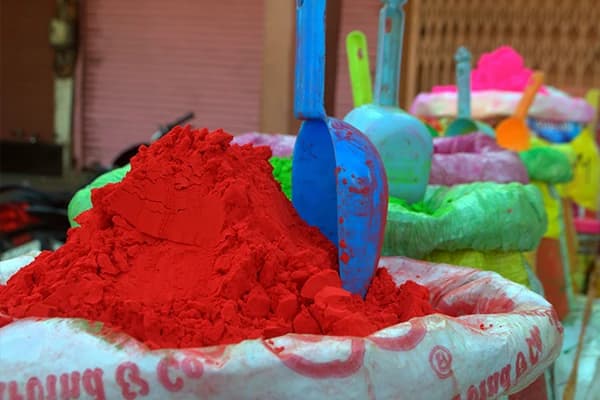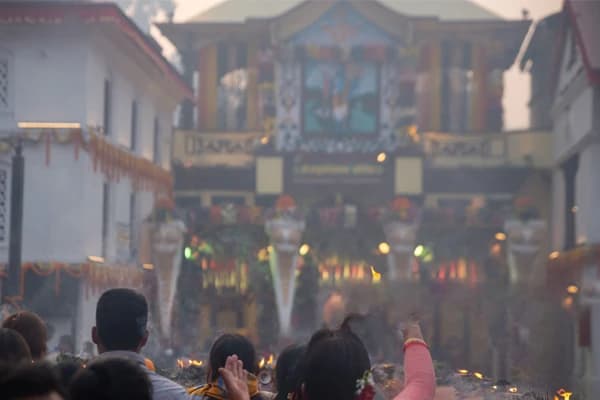History of Janai Purnima
Once, during the battle with demons, Lord Indra received a protective thread from his wife, Sachi. This thread empowered him to defeat the demon king, Bali. Since then, men from the brahmin, Kshatriya, and Vaishya castes have worn the janai thread (or Janeu).
The thread is given to a boy during the bratabandha ceremony. The ceremony marks the boy’s transition to adulthood. From then on, the boy changes his janai every year on the occasion of the Janai Purnima after performing all the necessary rituals. It is believed that the rituals renew the spiritual commitment of the boy and cleanse him of impurities.
In addition, a sacred thread is also tied around the wrist during the festival. The sacred thread serves as a spiritual amulet that protects the wearer from evil spirits and brings good fortune.
Rituals and Traditions Involved in Janai Purnima
The festival of Sacred Thread is associated with various rituals and traditions. These rituals and traditions involve changing the sacred thread, tying the protective thread, the Raksha Bandhan ceremony, and Kwati preparations.
- Changing the sacred thread (Janai) and tying the protective thread (Doro)

Hindu men change the janai every year. Men who wear janai engage in purification rituals like grooming practices and stick to a vegetarian diet. After that, participants gather at the sacred rivers and perform ceremonial baths.
Following the bath, the priest provides a new janai to replace the old one. The sacred thread is worn diagonally across the body from the left shoulder to the right waist. The rituals make the wearer eligible for performing the various rituals in Hinduism.
After that, a colorful protective thread, also known as Doro, is tied on the wrists of participants. The thread is imbued with mantras. Both men and women of all ages can wear the thread.

Raksha Bandhan is a special Hindu festival that celebrates the bond between brothers and sisters. Before the ceremony, sisters prepare the thali, which contains essential items for rituals like Rakhi, Kumkum powder, Diya, Agarbattis, and sweets.
For the ritual, the family members gather in one place. The actual ceremony begins with prayers and offerings made to deities for blessings. After the prayers, the sister ties the rakhi around the brother’s wrist while chanting prayers or mantras. As she ties rakhi, she marks her brother’s head with kumkum powder.
In response, the brother promises to protect his sister throughout her life. Then, the sister feeds her brother a sweet, and the brother gives a gift to his sister. In some places, it is tradition to tie a rakhi to a tulsi plant or peepal tree before trying to tie it to their brother’s wrist.
- Kwati Khane Din (Kwati Punhi)

The Janai Purnima is also called the Kwati Khane Din or Kwati Punhi. The kwati is a nutritious bean soup made up of several beans, including black gram, chickpea, field bean, soybean, green gram, field pea, garden pea, cowpea, and rice bean.
At first, the mixed beans are soaked overnight and left to sprout. Then the sprouting beans are cooked with various spices. After the beans are cooked properly, they are served hot, garnished with fresh herbs.
The Kwati dish is rich in nutrients, improves digestion, boosts immunity, promotes heart health, aids weight management, and regulates blood sugar levels.
How is Janai Purnima celebrated in cities like Kathmandu?
Janaipurnima is celebrated by performing various rituals in Kathmandu. On this day, Hindu men of the Bhramin and Chhetri castes take holy baths in rivers like Bagmati or Vishnumati. Then, they change their old sacred thread to a new one.
Following the rituals, Hindu women and people of other castes also participate in the festival rituals. They tie a protective thread around their wrists-right wrist for men and left wrist for women.
The Newari community also celebrates this festival in Kathmandu by performing various rituals, like feeding rice to the frogs. The family members gather to celebrate the festivals.
Social impact of the thread festival
The sacred thread festival has a huge impact on social life. The festival became an occasion for family reunions. This fosters a sense of belonging and strengthens familial ties. During the festivals, individuals of various backgrounds come together to celebrate the rituals.
Also, the festival attracts various visitors to the sacred places, like Gosaikunda and Kumbeshwor Temple. The langtang gosaikunda trek is popular during this festival. This promotes cultural exchanges between different communities.
Final Sayings
In short, Janai Purnima is an important Hindu festival celebrated all across Nepal and India. This festival indicates the beginning of the festival season. If you are planning to visit Nepal, this may be a great time to come and gain some cultural knowledge.
Janai Purnima is a great time for family reunions and cultural explorations. The rituals and traditions of the sacred thread festival emphasize the purification, protection, and strengthening of familial bonds.








